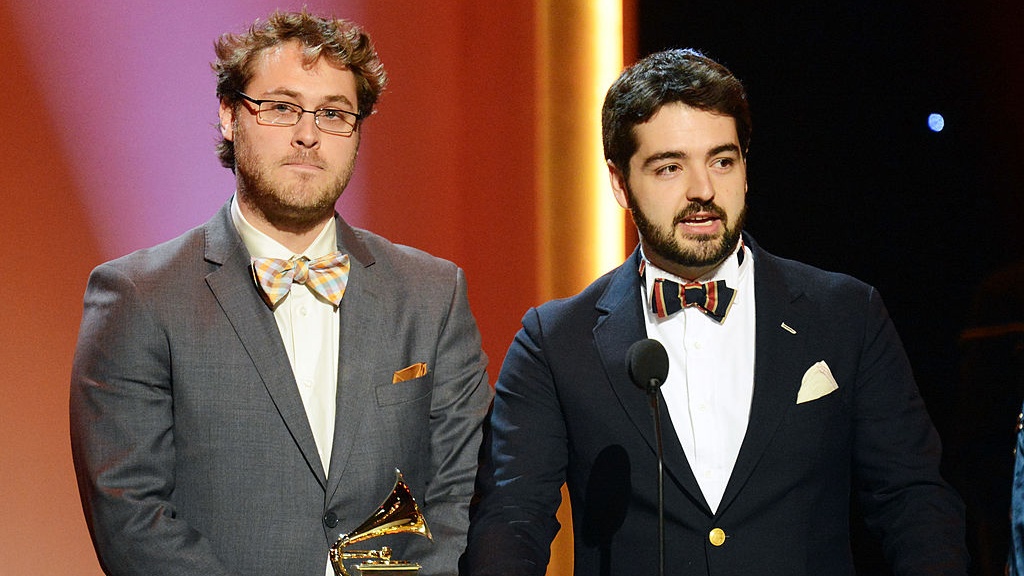A majority of the acts nominated for the Best Children's Album at the Grammy Awards this year are renouncing their claims for the award due to a lack of Black nominees.
Three of the five nominees are standing in solidarity with Black artists they said have historically been treated unfairly by the Grammy selection process, according to NPR. Each of the contenders in the children’s album category is white.
Boston-based singer Alastair Moock, music trio Dog on Fleas and The Okee Dokee Brothers wrote a letter to Grammy officials asking that their names be removed from the final ballots as they seek to even the playing field for artists of color.
"We thought that it was the strongest thing we could do, to stand with people of color whose albums are too often left out of the Grammy nominations," Joe Mailander, one half of the Okee Dokee Brothers, said. "[Children’s music] is not just white guys with guitars playing for kids. We want to welcome all different types of music to this community."
Moock called being a part of an all-white nomination group “tone-deaf” in light of the previous summer, which saw national protests erupt over social justice issues.
In December, the three nominees joined Family Music Forward, a collective focusing on amplifying Black voices in children's music, at a series of meetings with Harvey Mason Jr., the Recording Academy's new interim president and CEO, and Valeisha Butterfield Jones, the first chief diversity, equity, and inclusion officer.
"We're an organization that's ready for change, but you know, we're not unique to the challenges of the world and to the challenges of our industry," Butterfield Jones said. "I think it's time. You know, we saw in 2020 a racial reckoning. So now, you know, it's, you know, up to us what we're going to do to take real and meaningful action."
Since starting her job in May, Butterfield Jones said she's been looking for ways to grow diversity among the academy's membership and in the Grammy's secret nominating committees. Recently, the Grammys collaborated with the racial justice group Color of Change to help advocate on behalf of Black artists and hold music companies more accountable for their relationship with them, per NPR.
However, she said there is still much work to do before the Grammys leadership can feel good about any strides they’ve made in terms of uplifting communities of color.
Tiffany Haddish said she was approached by the Grammys to host a component of the award show without compensation, as Blavity previously reported. The actress said she was asked to pay for her own makeup, hair and wardrobe.
Mason Jr., later issued an apology to the actress on Instagram.
"It's just been brought to my attention that the Recording Academy invited Tiffany Haddish to host this year's premiere ceremony," he said. "Unfortunately, and without me knowing, the talent booker working for the Academy told Ms. Haddish that we wouldn't even cover her costs while she hosted this event. To me that was wrong. I'm frustrated by that decision.”
Popular children’s music artist Pierce Freelon was a prospect many of the protesting nominees felt should have been nominated this year for his celebrated album D.a.D., which incorporates parts of hip-hop, jazz, electronic music and Afro-Caribbean rhythms, according to NPR.
Freelon said he was grateful to receive the support of his peers and thanked them for their solidarity against injustice.
"I just couldn't think of another example in my memory of white men specifically revoking their privilege in this way," he said.
Freelon tagged a bevy of other nonwhite artists who should be in contention for the Grammy nod: Texas rapper SaulPaul; Colombian bilingual duo 123 Andrés; and 96-year-old folk singer Ella Jenkins.
"She's probably the most prolific and foundational person in children's music. And she's a Black woman. But guess what?" Freelon said. "She's never won a Grammy Award through the Recording Academy process."
